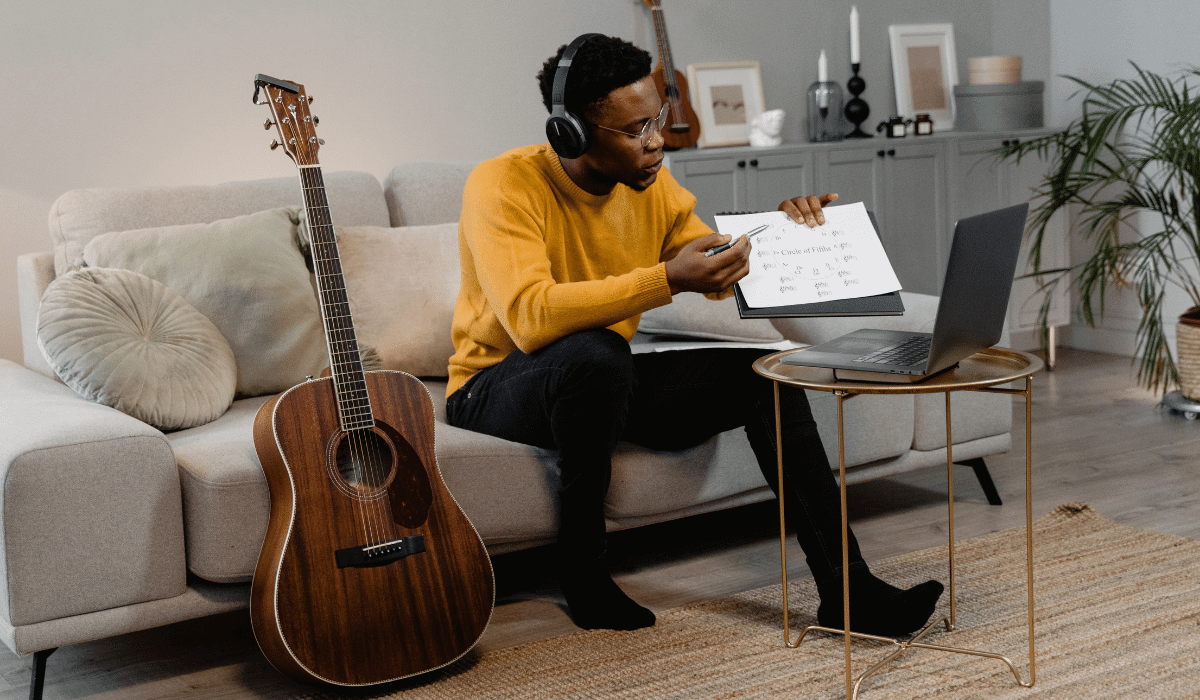The evidence from research shows that learning to play an instrument has several advantages in addition to being enjoyable, such as enhancing memory and motor coordination. It’s never too late to start learning music, even if you didn’t have the opportunity to as a young person. We’ll provide you with some tips on how to start simply studying music online.
With online learning, both the instructor and the student may choose their own speed for learning, and there’s also the extra flexibility of creating a timetable that works for everyone. Since using an online educational platform offers a better balance between work and study, nothing needs to be compromised.
Finding a solid work-study balance is easier when you study online, which teaches you important time management skills. There are many best music composition courses available now, and you can easily enroll in one of them by keeping the following tips in mind.
Here Are 7 Secret Tips to Study Music Online:
1. Choose the Kind of Music You Like
Pick an instrument and a kind of music you like when you wish to learn to play one. Choosing a subject that interests and appeals to you can help you remain motivated to practice and make it more enjoyable. Has the idea of playing the piano always been appealing to you?
The profession you have in mind for the future should help you select the instrument. Choosing a more portable instrument like the clarinet can be better if you are often on the go. If your house has weak walls and displeased neighbors, a digital piano with adjustable volume could be your best bet.
See Also: How to Create a Free Music App like Spotify?
2. Be Positive
The variety of music classes makes the ongoing planning challenging. A common complaint among instructors is that they feel that they spend more time preparing than actually teaching. But this preparation pays off and may significantly improve the impact of your instruction. A sound planning approach will save time from being squandered.
You might say that you are planning your planning. Consider the time you spend preparing as a window of opportunity for personal inspiration. Your ideas will make you feel proud, and putting them into practice in the classroom will make you happy.
3. Make Goals
Set reasonable expectations for what you want to learn and how much practice time you have available. Setting goals keeps you on track and makes it easier to monitor your progress. Consider your motivation for learning music while establishing your objectives.
Is it a pastime you like doing by yourself at home? Are you interested in jamming with your musical friends? After then, consider using the map to go there. We advise establishing your objectives using the SMART approach.
4. Keep Practicing
The greatest approach to achieving your objectives is to continuously practice. To ensure that you stay up with your study, create a practice routine. Regular practice sessions should go on to avoid distractions. The most suitable length of practice sessions is 25 minutes, which is more than enough. If even 25 minutes is too much time, search for other open moments throughout the day to practice for 10 to 12 minutes.
See Also: How to Choose the Best Music Classes for Remote Learning
5. Start Practicing Sections
You may increase the effectiveness of your practice sessions by concentrating on memorizing smaller segments of a piece of music, a technique known as “chunking.” “Chunking” the practice makes it easier to consume, and what you learn stays with you longer. You may even go measure-by-measure for really challenging areas.
Practice carefully from the first beat of one measure to the first beat of the next measure to accomplish this. Once you are comfortable with that measure, build up and practice parts of two, four, and so on, quickening the speed as you go.
6. Start Recording Yourself
Recording yourself as you practice is another excellent piece of advice. It might be challenging to concentrate when playing and provide careful attention to the sound. You may concentrate on the sound you are making by recording yourself and listening to the audio afterward. You can hear when there are tempo shifts, finger slipups, or areas where your phrasing needs work.
7. Keep Yourself Aware of Music Theory and History
Studying basic music theory and music history in addition to listening to a lot of music will help you develop your musicality and put the songs you are learning into perspective. As you study additional pieces, you could see commonalities in musical structures because music theory will help you make sense of the melodies and chords in your piece, making them simpler to learn.
Also Read: What Is the Best Free Software for Beat-Making?
Conclusion
A lot of people don’t believe that you can study music online and get the same results as if you were to attend a physical school. However, there are many different techniques that you can use in order to make sure that you are getting the most out of your studies. The seven secret methods for studying music online will help ensure that you have all the tools that you need in order to succeed. Make sure to utilize all of these tips in order to get ahead!



